Tyumen emerged as an outpost of Russia, expanding its influence at the expense of the Siberian Khanate. The city was founded in 1586 by the voivodes Vasily Sukin and Ivan Myasnoy, who decided to put а stockade on the cape between the Tura and Tyumenka rivers, not far from the abandoned settlement of Chingi-Tura — the capital of the Tyumen Khanate, or «The Great Tyumen». It is known that in addition to huts and barns, they immediately built a church in the name of the Transfiguration of the Lord. The area where the first prison was located suffered from the overflowing of River Tura, but the Historical Square with a commemorative stone is approximately at this place now.
In 1616 the first men’s monastery was laid in the city. Nowadays it is the Holy Trinity Monastery, in which the relics of Metropolitan Philotheus are stored, whose activities for the baptism of the local population were marked even by the Emperor Peter the Great. From the second half of the 17th century artisans reached Tyumen. And the first ship in Siberia was floated out in 1836 in Tyumen, and the city became the regional shipbuilding center. The Trans-Siberian Railroad gave an additional impetus to the development of the city.
In the 1860s in Tyumen they started brewing their own beer at the Davydovskaya brewery. Some varieties, for example, «Kulbaherskoe», «Extra» and «Cabinet» were marked at international exhibitions. Brewing traditions are now lost, but an interest has been recently growing in the original Siberian cuisine of the northern peoples of the Khanty and Mansi. The basis of local cuisine is freshwater fish, mushrooms, berries. Delicacy muksun, nelma and sterlet are traditionally served as slices of frozen fish served cold or in ukha (fish soup). In addition, in Tyumen one can taste tartar made of reindeer as well as dishes made of wild boar, moose and even bear. For acquaintance with delicacies of this region September is better, when the best Tyumen restaurants hold a gastronomic festival and give an opportunity to taste the branded sets from the chefs for a fixed price.
The period from the XIX to the beginning of the XX century left a notable mark in the architecture of Tyumen. In the former building of the City Duma, which was built in 1824, a Museum of Local Lore after I.Y. Slovtsov is located. In 1871 a watch appeared on the building — an analog of the Kremlin chimes. Now it does not play music, but remains in the working order. The permanent exhibition of the museum is dedicated to the paleontological finds: the largest mammoth skeleton in Russia, full skeletons of bison, woolly rhinoceros and cave bear. In the house museum of the industrialist Masharov, built in the late 19th century in neoclassical style, one can see how the merchant family of that time lived. Musical parties are regularly held in the living room of the mansion. The building of the Tyumen State University of Architecture and Civil Engineering on Lunacharsky Street, built in 1914, is a sample of neoclassicism. Another museum works at the Kolokolnikovs’ estate. This mansion combines elements of neoclassicism and baroque. And the two-story Renaissance building of the Alexander Real School in 1878 (now Tyumen State Agricultural Academy) is considered to be one of the most beautiful buildings in the city.
After the revolution Tyumen became the capital of the province. During the Great Patriotic War dozens of factories were evacuated to the city, which became the impetus for the development of industry. At the same time all other towns of the region were called towns rather nominally. That is why in the post-war period Tyumen was jokingly called the «capital of villages». The further destiny of Tyumen was determined by exploratory expeditions of 1940-1960-ies, which discovered large reserves of oil and natural gas in the region. This stimulated the emergence of scientific institutions and universities in the city, the growth of the population and the construction of new micro-districts.
One of the most significant buildings of the last time is the Tyumen Drama Theater. Opened in 2008 it has become the biggest dramatic theater in Russia by its size! The symbol of the city is the Bridge of Lovers. This cable-stayed pedestrian bridge was built in 1987 on the site of an ancient wooden bridge that collapsed. After the competition for an unusual kiss that was held on the bridge in 2003, it was officially renamed. A beautiful view of the bridge opens from the unique four-level embankment of the River Tura and from the Historical Square, where there is a stele and an eternal flame burns in memory of those killed in the Great Patriotic War.
There are several unusual monuments in Tyumen. In particular, one of the most famous sculptural groups in Tyumen is the Siberian Cats Square with 12 playing cats. In the Pharmaceutic Garden opposite the city hospital of the beginning of the XX century there is a monument to Grigory Rasputin. It recalls that one of the most controversial characters of the Russian history was born near Tyumen in the village of Pokrovskoe where his house-museum now operates.
Siberia is rarely associated with spa resorts, but only a few kilometers far from Tyumen one can find geothermal springs. Here water strikes with a temperature 37-50 ° C. Therefore open air medical baths may be taken all year round. Mineral water composition, well-equipped swimming pools with changing rooms, cafes, fountains and children’s areas have turned these places into popular balneological resorts.
Since 1980 on the last Sunday of July Tyumen residents celebrate the City Day with a festival of fireworks. The Street Theatre Festival «Dreams of Streets» is also held during that period. Acrobats on stilts, musicians, clowns, mimes, dancers and circus folk perform on Tsvetnoy Boulevard. In June there is also a Festival of Russian Culture with performances of folklore groups and master classes on traditional crafts. In late August fans of rock music are going to the city for a two-day festival «Scram Square». Tyumen is a great start for getting to know Siberia and the eastern part of Russia. Guests of the growing oil capital are welcomed by hospitable Siberians, original cuisine and entertainment for every taste — from mineral spa to theatrical and sports events of the world level.
Get directions
The flight from Moscow to the international airport «Roshchino» in Tyumen will take less than three hours. Flights from Turkey, Tajikistan, Azerbaijan, Bulgaria, Greece, the UAE, Thailand, Cyprus also land in Tyumen. One can get from Moscow to Tyumen by train as well. The journey by train on the Trans-Siberian Railway will take 30 hours.
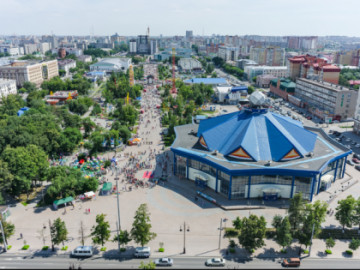
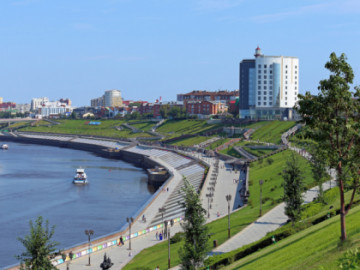
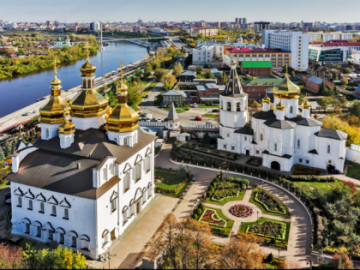
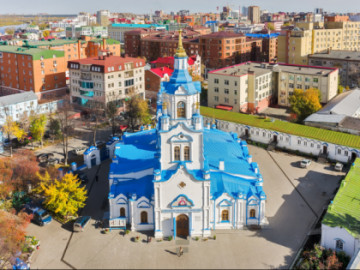
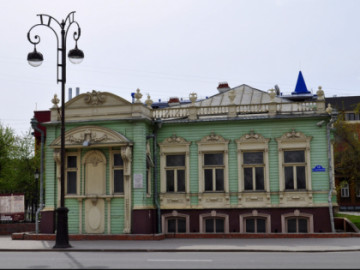
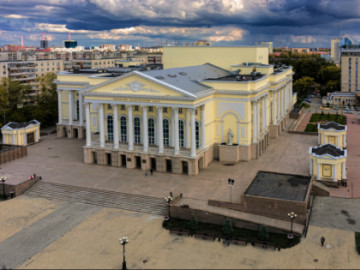
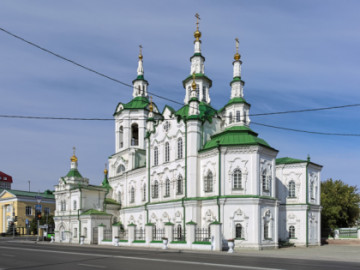
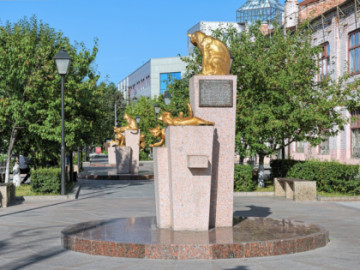
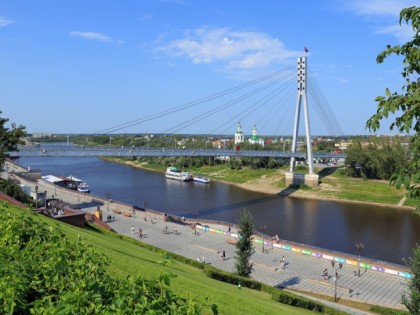
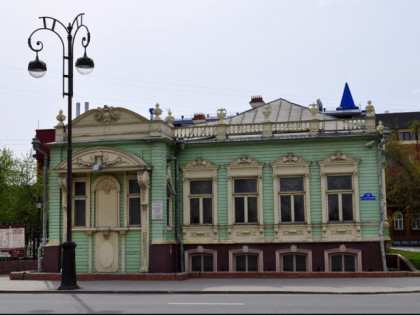
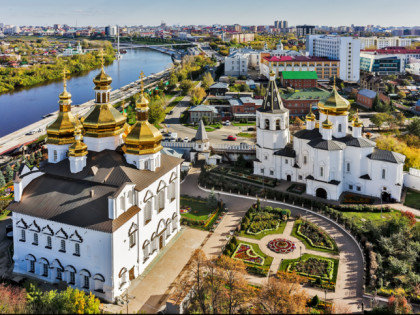
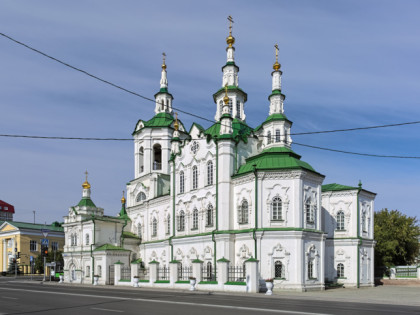
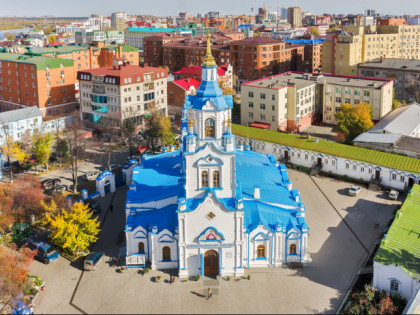
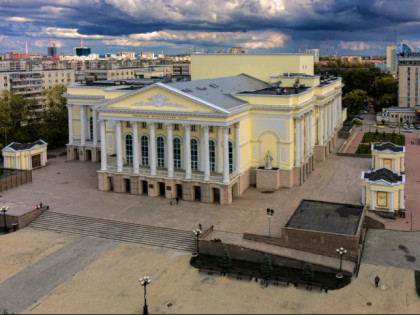
 Museums and Exhibitions
Museums and Exhibitions
 Parks and recreation
Parks and recreation
 Other places
Other places
 Architectural Monuments
Architectural Monuments
 Temples and places of worship
Temples and places of worship
